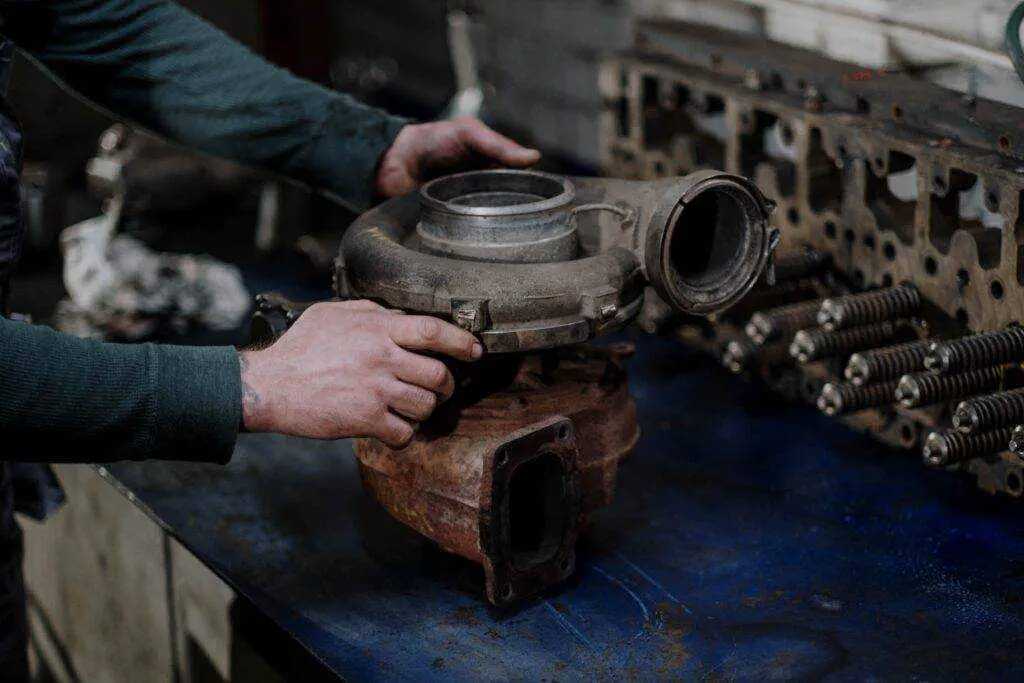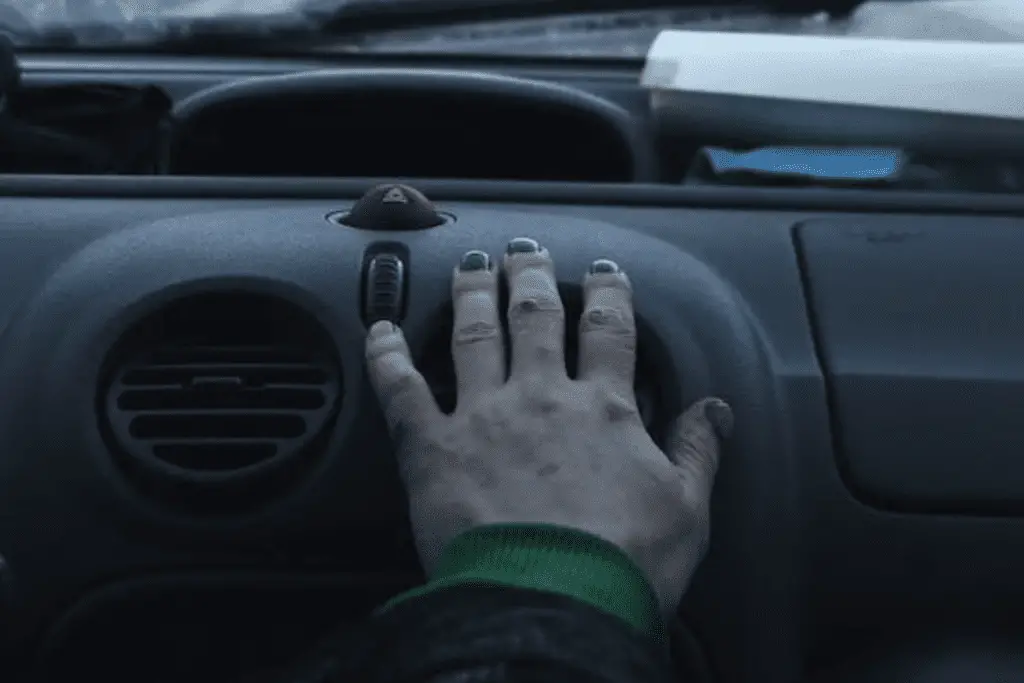An overheating engine is every driver’s nightmare. Seeing smoke billowing from under the hood, smelling something burning, or watching the temperature gauge creep into the danger zone can cause panic. However, understanding What Causes a Car to Overheat? can help you prevent it or address it promptly when it happens. potential
Engine overheating can occur due to many factors. By learning some of the most common culprits, you’ll be better prepared to maintain your vehicle and deal with overheating if it occurs. Let’s explore nine frequent causes of automotive overheating and how to address them.
1. Low Coolant Level
Coolant, also known as antifreeze, is the lifeline of your engine cooling system. This mixture of water and coolant absorbs heat from the engine and radiates it through the radiator. What Causes a Car to Overheat? Low coolant levels reduce the system’s ability to transfer heat effectively.
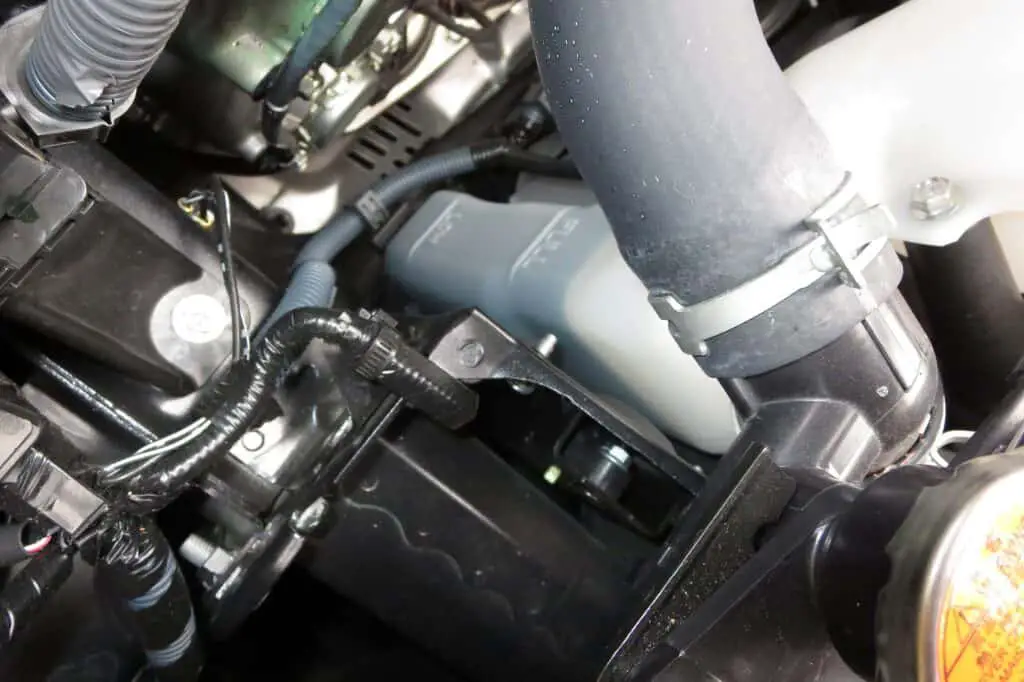
Causes of low coolant:
- Leaks – External leaks from hoses, gaskets, or the radiator; internal leaks through the head gasket or engine block.
- Overdue service – Neglecting routine coolant flushes and refills.
- Undetected leaks – Small leaks over time.
Solutions:
- Visually inspect for leaks and wet spots under the car.
- Pressure test the cooling system to check for internal leaks.
- Follow the service schedule for coolant replacement.
- Top off the coolant/water mixture as needed.
2. Cooling System Blockages
For the cooling system to work, coolant must flow freely through the radiator, hoses, water pump, and passages within the engine. Any restrictions or blockages in these components can prevent heat from dissipating, leading to overheating.
Causes of blockages:
- Mineral deposits and corrosion
- Debris stuck in the radiator
- Damaged water pump impeller
- Collapsed hoses
Solutions:
- Flush the system regularly to clean out scale and deposits.
- Check radiator fins for bugs, leaves, and other debris. Clean as needed.
- Replace older hoses that may have collapsed internally.
- Test water pump operation and rebuild or replace as necessary.
3. Faulty Radiator Cap
What Causes a Car to Overheat? While it may seem insignificant, a faulty radiator cap can be the culprit behind an overheating problem. The cap is responsible for maintaining the proper pressure inside the cooling system. This pressure raises the coolant’s boiling point and allows it to absorb more heat.
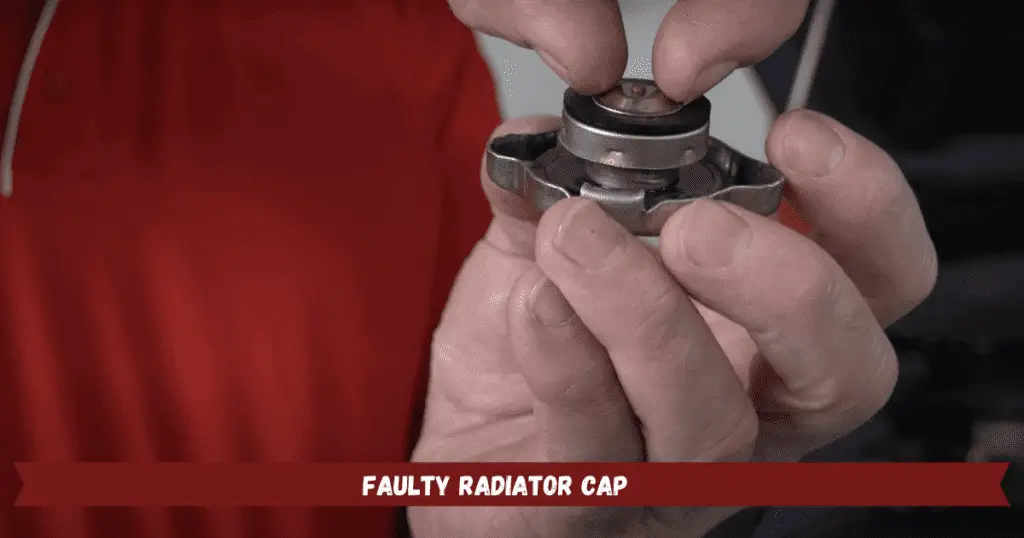

Causes of failure:
- Worn-out spring inside cap
- Cracked or misshapen seals
- Corrosion buildup on cap mating surfaces
Solutions:
- Visually inspect the cap for damage or corrosion.
- Replace the radiator cap if old, cracked, or sticking.
- Only use the factory-approved cap for your vehicle.
4. Damaged Radiator
The radiator and its cooling fan are vital to lowering coolant temperature after picking up heat from the engine. Cracked, leaking, or obstructed radiators cannot dissipate heat effectively.
Causes of radiator damage:
- Internal blockages like mineral deposits.
- Bent cooling fins hampering airflow.
- External damage from road debris.
- Corrosion from age or improper coolant mixtures.
Solutions:
- Inspect the radiator for damage, leaks, and blockages.
- Use a pressure tester to check for internal faults.
- Clear any obstructions in front of the radiator.
- Replace the radiator if severely damaged or leaking.
5. Water Pump Failure
A faulty water pump cannot adequately circulate engine coolant. Without coolant flow, hot spots develop which can quickly lead to overheating.
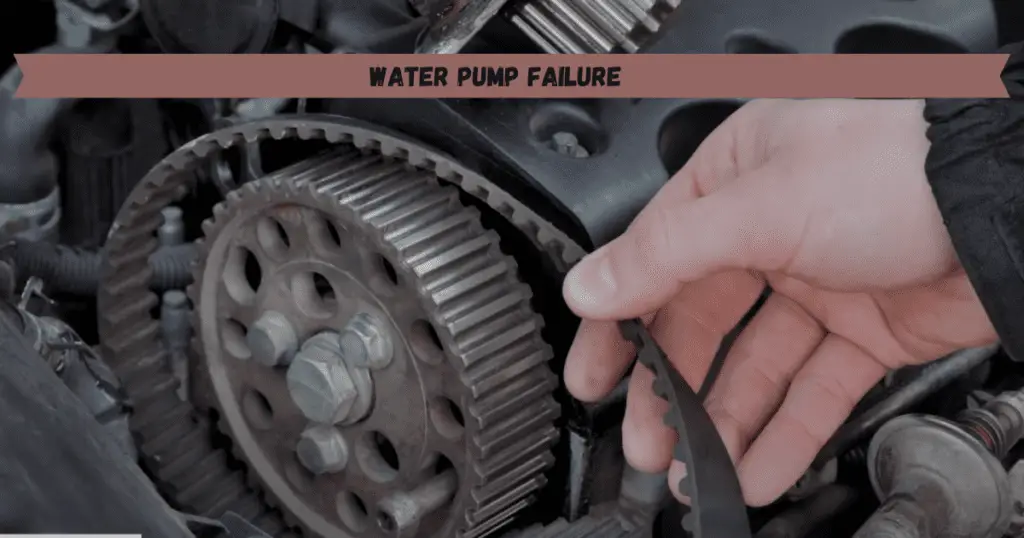

Causes of water pump failure:
- Bearing wear allowing the impeller to wobble
- Impeller corrosion causing loss of pumping efficiency
- Leaking pump seals reducing coolant flow
- Broken impeller vanes obstructing flow
Solutions:
- Listen for water pump noise indicating bearing wear.
- Test pump operation. Replace if faulty pressure or flow.
- Rebuild or replace the pump when wobble, corrosion, or leaks are found.
6. Thermostat Sticking Closed
The thermostat controls coolant flow to the radiator based on engine temperature. When closed, it blocks the flow allowing the engine to warm up faster. If the thermostat sticks closed, it will prevent cooling circulation causing rapid overheating.
Causes of thermostat failure:
- Partially blocked thermostat unable to open fully
- Loss of sealing due to internal gasket failure
- Corrosion or deposits on the thermostat valve
- Age and wear of internal spring mechanism
Solutions:
- Replace the thermostat if the engine takes too long to warm up.
- If overheating, test the thermostat opening temperature with a tester.
- Replace faulty thermostat to restore proper coolant flow control.
7. Cooling Fan Malfunction
With the engine off or idling, airflow through the radiator is limited. The supplemental electric cooling fan is necessary to maintain airflow for heat dissipation during these conditions. Fan failures can lead to localized overheating.
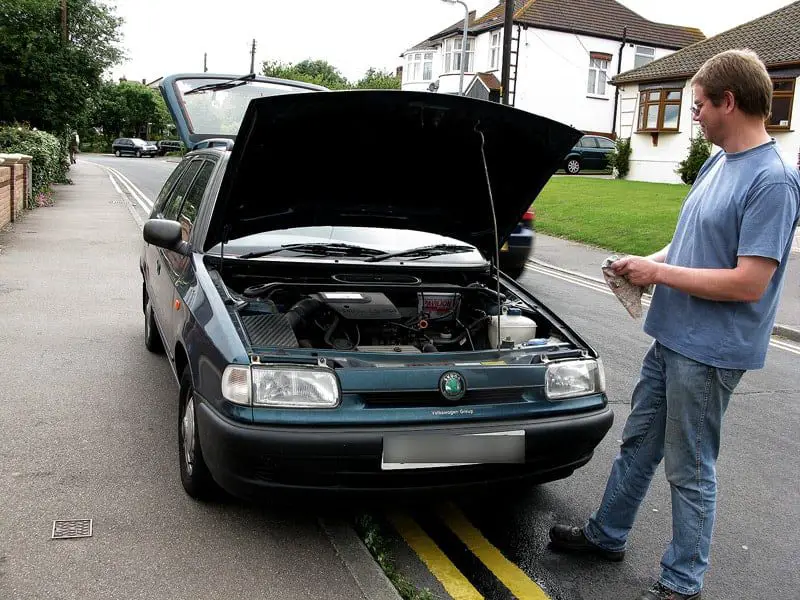

Causes of fan malfunctions:
- Faulty fan relay or wiring
- Mechanical binding, debris, or seized bearing
- Cracked, bent, or unbalanced fan blades
- Temperature sensor or computer faults
Solutions:
- Verify fan activation under idle/low speeds. Listen for operation.
- Test fan wiring and relay switch.
- Inspect for bent, obstructed, or seized fan hubs.
- Replace fan assembly if faulty bearings, blades, or accessories.
8. Loose or Broken Belts
What Causes a Car to Overheat? The serpentine belt drives critical engine accessories like the water pump, power steering pump, alternator, and A/C compressor. If this belt breaks or slips due to wear or tension loss, the water pump will stop circulating coolant leading to overheating.
Causes of belt issues:
- Fraying and dry rotting belts from age/wear.
- Oil or coolant leaks deteriorating belt rubber.
- Misalignment of accessories putting extra strain on the belt.
- Overloaded belt with failing bearing or pulley.
Solutions:
- Inspect belts frequently. Replace if cracked or glazed from wear.
- Identify misaligned components and improper belt routing.
- Check pulley bearings for noise or wobble indicating imminent failure.
- Confirm proper belt tension to prevent slippage.
9. Insufficient Engine Oil
What Causes a Car to Overheat? Most people associate oil with lubrication, but it also plays a vital role in cooling. Along with coolant, oil helps transfer heat away from internal components. Low oil levels greatly reduce this cooling effect.
Causes of low oil:
- Infrequent oil changes allowing contamination buildup.
- External oil leaks through gaskets, seals, or housing.
- Internal leaks via worn piston rings or cylinders.
- Inaccurate oil level readings due to faulty sensor.
Solutions:
- Regular oil and filter changes as specified by the vehicle.
- Inspect for leaks. Repair or reseal as necessary.
- Address damaged components allowing oil to burn or leak internally.
- Confirm accurate oil level readings with the dipstick. Top off as needed.
Conclusion – What Causes a Car to Overheat?
Engine overheating can stem from multiple causes. However, vigilance around maintenance and awareness of potential problems allows many issues to be prevented or addressed before heat damage occurs. While breakdowns happen, understanding what makes an engine run hot empowers you to react appropriately. With quick action, you can help preserve engine life and avoid costly repairs down the road.
FAQs – What Causes a Car to Overheat?
How do you fix a car that overheats?
First, allow the overheated engine to fully cool down before attempting repairs. Check coolant levels and top up if low. Inspect hoses, radiators, water pumps, thermostats, belts, and other components for faults. Flush contaminated coolant and replace any leaking or damaged parts.
How do you stop a car overheating?
If overheating on the road, turn the heat to max, turn off the AC, open windows, and safely pull over. Don’t remove the radiator cap until fully cooled. Top-off coolant is low. If no leaks are visible, you may cautiously drive to a shop and watch the temperature gauge. Have overheating cause diagnosed.
What causes a car to overheat while driving?
Common while driving causes include coolant leaks, faulty water pump or thermostat failing to properly circulate coolant, low coolant levels, damaged radiator, broken fan, stuck thermostat keeping coolant from flowing, collapsed hoses blocking flow, and slipping belts driving the water pump and fan.
Why is my car overheating but the coolant is full?
With a full radiator, causes may include the thermostat stuck closed preventing coolant from reaching the radiator, blockages in hoses/radiator passages impeding flow, water pump failure unable to circulate coolant properly, radiator cap not holding pressure, detached internal coolant passage, or head gasket leak mixing coolant and combustion gases.
Can I use water instead of coolant?
Water alone has a lower boiling point and poorer heat transfer properties compared to a proper coolant/water mix. It also provides no corrosion protection. Replacing all coolant with water is not recommended. But you may top up with distilled water in an emergency until you can have proper coolant concentrations restored.
How can I cool my car engine?
Methods to help cool an overheating engine include turning on the heat and opening windows to pull heat away, carefully driving with AC off to increase airflow, topping up coolant if low, pulling over to let the engine cool before it overheats further, and having the cause diagnosed and repaired by a professional as soon as possible.


